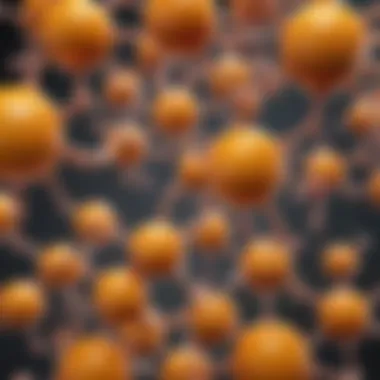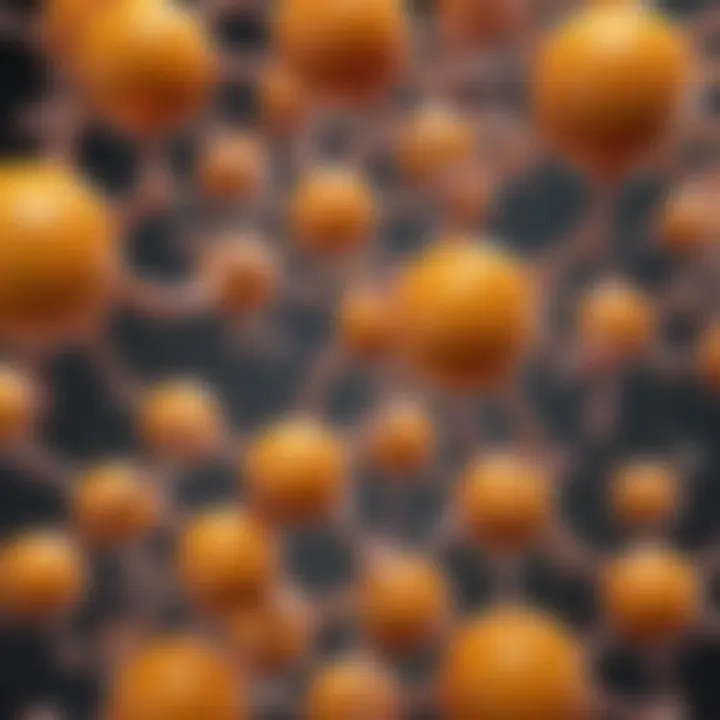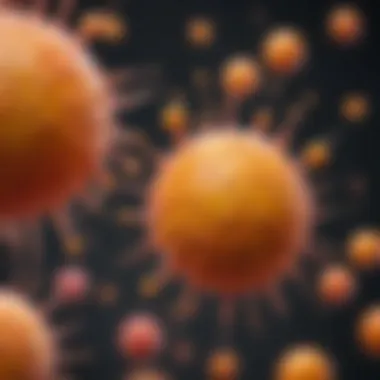Exploring Vitamin C's Impact on Cancer Prevention


Background and Context
Vitamin C, or ascorbic acid, is a water-soluble vitamin that plays a key role in numerous bodily functions, including collagen synthesis, immune function, and fighting oxidative stress. Over time, researchers have been intrigued by its potential implications in cancer prevention. This exploration is not just a passing curiosity; it has roots in historical practices where high citrus consumption was believed to ward off diseases, including scurvy. As science progressed, so did the understanding of how micronutrients, particularly antioxidants like vitamin C, might influence more serious health outcomes.
In the late 20th century, notable figures like Linus Pauling championed the benefits of vitamin C, positing that it could not only prevent colds but also combat cancer. While some claims were met with skepticism, they laid the groundwork for extensive research into the potential protective roles of vitamins and minerals against cancer.
Key Findings and Discussion
Recent studies have illuminated several key ways in which vitamin C may contribute to cancer prevention:
- Antioxidant properties: Vitamin C acts as a powerful antioxidant, helping to neutralize free radicals in the body. Free radicals can damage cellular structures and contribute to cancer development. By mitigating oxidative stress, vitamin C indirectly limbers the cellular environment, potentially reducing mutation rates.
- Immune system support: A robust immune system is crucial in identifying and eliminating precancerous or malignant cells. Vitamin C enhances various immune functions, making it an important ally in cancer defense strategies. For instance, it plays a role in the proliferation and function of lymphocytes, including T cells, which are key players in immune response.
- Apoptosis induction: Several studies point to the fact that vitamin C can trigger programmed cell death in cancer cells, known as apoptosis. While regular cells thrive and replicate, cancer cells may resist such mechanisms, leading to uncontrolled growth. This vitamin appears to help tip the scales against malignancies by nudging these rogue cells towards self-destruction.
"The potential of vitamin C to influence cellular processes is a fascinating area of study that deserves deeper examination to unveil the complexities inherent in cancer prevention."
While these findings are promising, it is essential to recognize the limitations of current research. Cancer is notoriously multifactorial; factors such as genetics, lifestyle, and environmental exposures intertwine in intricate ways. Thus, while vitamin C may play a role in reducing cancer risk, it likely does not act as a standalone solution. In light of these complexities, dietary recommendations should acknowledge this multifaceted nature, suggesting that individuals prioritize a balanced diet rich in diverse vitamins and minerals rather than relying solely on supplements.
Going forward, more rigorous clinical trials and demographic studies are essential to cement our understanding of vitamin C in cancer prevention. Research needs to arise that evaluates specific dosages, forms (like natural versus synthetic), and the timing of vitamin C intake relative to cancer treatments.
Preface to Vitamin and Its Biological Importance
Vitamin C, known scientifically as ascorbic acid, performs a variety of crucial functions not only in our daily health but also notably in the context of cancer prevention. Research is increasingly focusing on how this potent vitamin should be seen as a protective ally against malignancies, rather than just a simple dietary supplement. By understanding its biological importance, we can appreciate its potential role in preventing cancer and enhancing our overall health.
Historical Context of Vitamin Research
From its discovery in the 18th century, vitamin C has undergone a substantial transformation in understanding within the scientific community. Initially associated with preventing scurvy, particularly among sailors on long voyages, the narrative evolved as researchers in the 20th century began exploring its broader health implications. Linus Pauling, a two-time Nobel Prize winner, famously popularized the concept that high doses of vitamin C could combat cancer, which stirred both intrigue and skepticism. His claims ignited waves of studies exploring vitamin C's role in cancer prevention. However, the research landscape has been mixed—offering both support and contradiction over the years. This historical backdrop is vital, as it influences current thought patterns and ongoing debates in nutritional science regarding vitamin C's efficacy against cancer.
Basic Biochemical Properties of Vitamin
At its core, vitamin C serves several essential biological functions.
- Antioxidant Capacity: The vitamin is renowned for its strength as an antioxidant, capable of neutralizing free radicals that can cause cellular damage. This property is particularly significant in cancer biology where oxidative stress contributes to tumorigenesis.
- Collagen Synthesis: Vitamin C is integral to collagen production, impacting cellular structures and tissue repair. Collagen not only forms the backbone of our skin but is also crucial in many physiological processes, including healing and immune response.
- Regulatory Effects on Gene Expression: Emerging evidence suggests vitamin C can influence certain genes' expression, which may provide a link to cancer cell behavior. This interaction highlights an area ripe for further study, particularly in understanding tumor growth and metastasis.
The multifaceted roles of vitamin C in biological systems underscore its potential importance in the conversation about cancer prevention. Understanding these properties is foundational in unraveling the complex links between vitamin C intake and cancer risk.
Understanding Cancer: A Complex Disease
Understanding cancer is crucial as we explore the potential protective role of vitamin C against its multifaceted development. Cancer isn't just one disease; it's a collection of related diseases that can arise in nearly any tissue of the body. This understanding helps us appreciate the complexities behind cancer's origin and proliferations, which makes linking any dietary component, like vitamin C, to prevention or treatment a challenging endeavor.
Types and Classifications of Cancer
Cancer can be broadly categorized into various types and classifications, which range from benign tumors that pose minimal risks to malignant ones that can spread aggressively. Here’s a breakdown of some predominant types:
- Carcinomas: These are cancers arising from the epithelial cells lining organs and tissues, such as lung, breast, and prostate cancer.
- Sarcomas: Forming in connective tissues like bones and muscles, sarcomas are less common but often aggressive.
- Leukemias: These begin in blood-forming tissue, such as bone marrow, leading to the production of abnormal blood cells.
- Lymphomas: Arising from the lymphatic system, these cancers affect the immune system and can drastically impact health.
- Central Nervous System Cancers: These tumors occur in the brain and spinal cord.
Each type has different subcategories, with specific characteristics, behaviors, and responses to treatment, making them unique challenges in medical research and treatment. Understanding these distinctions is vital for designing targeted prevention strategies using nutrients like vitamin C.
Etiology and Risk Factors for Cancer


The etiology of cancer embodies a complex interplay between genetic predispositions, environmental influences, and lifestyle choices. Below are some principal factors contributing to cancer risk:
- Genetic Factors: Certain inherited mutations can elevate the risk for specific cancers. Individuals with BRCA1 or BRCA2 gene mutations, for example, have a significantly increased risk of breast and ovarian cancers.
- Environmental Exposures: Carcinogens in our environment, such as tobacco smoke, pollution, and radiation, can trigger cellular changes leading to cancer.
- Lifestyle Choices: Diet, physical activity, and alcohol consumption play significant roles in overall health, influencing cancer risk. A diet lacking in essential nutrients, including vitamin C, can detract from the body’s defense systems.
- Infections: Some cancers are linked to viruses and bacteria. For example, Human Papillomavirus (HPV) is associated with cervical cancer, while Hepatitis B and C can lead to liver cancer.
Looking into these factors helps not only in understanding cancer's pathology but also emphasizes the potential preventative benefits of nutritional adequacy, highlighting vitamin C’s possible role in influencing these risk factors.
"Cancer is a multifaceted disease that requires a nuanced approach for understanding and prevention."
Vitamin C: Mechanisms of Action Against Cancer
When exploring the potential role of vitamin C in cancer prevention, one essential aspect is how it operates at a cellular level. Vitamin C is often hailed for its antioxidant properties, yet its mechanisms go far beyond this single function. Understanding the various pathways through which vitamin C influences cancer biology could provide insights into preventative strategies and therapeutic approaches. As research continues to unfold, it becomes apparent that vitamin C might play multiple roles in combating the complexities surrounding cancer development.
Antioxidant Properties of Vitamin
Vitamin C, scientifically known as ascorbic acid, is widely recognized for its antioxidant capabilities. These properties allow it to neutralize free radicals—unstable molecules that can damage cells through oxidative stress. Oxidative stress has been implicated in the initiation and progression of cancer; hence, the antioxidant role of vitamin C becomes crucial.
- Reducing Oxidative Damage: Increased free radical production can lead to DNA mutations, a key event in cancer formation. By scavenging these radicals, vitamin C may help in preserving DNA integrity.
- Enhancing Other Antioxidants: Moreover, vitamin C can regenerate other antioxidants, such as vitamin E, thereby amplifying the overall antioxidant defense system.
"Inadequate vitamin C intake may significantly increase the risk of oxidative stress, setting the stage for cancer development."
However, while its antioxidant properties are vital, it's also important to consider that vitamin C's effects may depend on its concentration. In certain contexts, high levels of vitamin C might induce the production of reactive oxygen species (ROS) that are detrimental to cancer cells. This dual nature can complicate its potential applications.
Influence on Collagen Synthesis and Cell Signaling
Beyond its role in combating oxidative stress, vitamin C is essential in synthesizing collagen, a protein crucial for tissue repair and structural integrity. The link between collagen and cancer isn't entirely straightforward but warrants attention.
- Collagen’s Structural Role: As a key component in connective tissues, collagen is fundamental in maintaining the architecture of healthy tissue. Altered collagen metabolism can lead to a conducive environment for tumor growth.
- Cell Signaling Mechanisms: Vitamin C plays a role in various signaling pathways, including those involved in cell proliferation and apoptosis (programmed cell death). Through these pathways, it may influence cancer cell behavior—either promoting death in damaged cells or fostering survival in healthy ones, depending on the context.
This complexity suggests that a balanced intake of vitamin C might assist in maintaining cellular homeostasis, ultimately playing a preventative role against tumorigenesis.
Effects on Immune Function and Cancer Cells
The immune system is the body’s frontline defense against cancer, and vitamin C significantly enhances immune function. Research has shown that vitamin C can bolster various immune cells, such as lymphocytes and phagocytes, which can better target and destroy cancerous cells.
- Boosting Immune Response: By enhancing the production of white blood cells, vitamin C helps the immune system respond more robustly to cancer cells.
- Direct Effect on Cancer Cells: Some studies have indicated that high concentrations of vitamin C can directly induce apoptosis in certain cancer cells, effectively reducing malignant growth.
Epidemiological Studies: Vitamin and Cancer Risk
Epidemiological studies are essential in understanding the complex relationship between vitamin C intake and cancer risk. These studies serve as a bridge between laboratory research and the real-world implications of dietary habits. They help assess patterns, causes, and effects in populations, which is vital for identifying potential dietary modifications that could mitigate cancer risks. The gathering of data through observational studies and clinical trials enables researchers to draw correlations that might not be immediately apparent through bench research alone.
When examining the role of vitamin C, it's crucial to consider factors such as the population studied, the vitamin C measurement methods, and how other lifestyle variables may confound the results. This approach allows for a more nuanced view of the links between vitamin C and cancer, rather than oversimplified conclusions that could lead to misunderstanding.
Notably, the findings derived from these studies can influence public health recommendations and nutritional guidelines, but they need to be interpreted cautiously. The variability in outcomes highlights the need for further investigation into how vitamin C might act differently depending on the type of cancer, individual genetics, and environmental exposures.
Observational Studies and Findings
Observational studies have unearthed a range of findings regarding vitamin C's impact on cancer risk. A collection of research analyzed dietary patterns in various populations, observing correlations between high intakes of vitamin C and lower incidences of certain cancers, notably lung and stomach cancers.


For instance, some studies indicated that individuals with a higher consumption of fruits and vegetables—rich sources of vitamin C—tended to show reduced risk for developing cancer in these areas. The idea here is that antioxidants like vitamin C might combat oxidative stress, a contributor to DNA damage and cancer progression. However, the variations in study design and participant demographics complicate the interpretation of these findings.
"Nutritious food choices such as citrus fruits, bell peppers, and leafy greens enhance daily vitamin C intake while potentially reducing cancer risk."
When it comes to observational research, one must keep in mind the role of lifestyle factors. Those who consume higher amounts of fruits and vegetables often adhere to healthier lifestyles overall, which can obscure the isolated impact of vitamin C itself. Therefore, while these observational findings are encouraging, they are just a piece of the larger puzzle in determining the effects of vitamin C on cancer prevention.
Clinical Trials: Vitamin Supplementation
Clinical trials pave the way for more concrete answers about vitamin C supplementation and its effects on cancer risk. These trials typically take a more controlled approach, allowing researchers to specifically isolate the effects of vitamin C from other confounding factors present in observational studies.
Some trials have tested the efficacy of vitamin C, both in dietary forms and through intravenous administration, as an adjunct to conventional cancer treatments. For instance, the use of high-dose vitamin C in combination with chemotherapy or radiation has been explored as a strategy to enhance treatment efficacy and minimize side effects. Early findings suggest that this might allow selectively for cancer cells to succumb while sparing healthy tissues.
However, the results from clinical trials have been mixed. Some reported no significant impact on tumor growth or overall survival, while others showcased potential benefits. This disparity sheds light on the complexity of cancer as a multifactorial disease, where vitamin C could play varying roles depending on the cancer type and treatment protocols.
As researchers continue to delve into this area, the implications of these clinical trials could transform our understanding of vitamin C and its potential as a preventive agent against cancer. Examining a range of factors such as dosage, method of delivery, and timing of administration remains imperative for future studies.
The Role of Dietary Sources of Vitamin
The significance of dietary sources of vitamin C cannot be overstated when it comes to cancer prevention. With the increasing awareness around dietary health and nutrition, understanding where to obtain this vital nutrient is essential. Vitamin C, also known as ascorbic acid, is pivotal not just for immune function but also plays a potentially protective role against various cancers. The food choices we make today may influence our health landscape down the road, making the exploration of these sources both relevant and necessary.
First off, it’s crucial to consider why dietary vitamin C matters. Unlike some animals, humans are unable to synthesize vitamin C in our bodies, which places an added emphasis on dietary intake. A consistent supply through fruits and vegetables is vital to maintaining optimal levels. Moreover, the bioavailability of vitamin C from food sources is typically higher than that from supplements, suggesting that natural sources should be prioritized.
Fruits and Vegetables Rich in Vitamin
When we talk about vitamin C-rich foods, fruits and vegetables come to the forefront. They not only provide this essential nutrient but also supply various phytonutrients and antioxidants that work synergistically to bolster our defense against cancer.
- Citrus Fruits: Oranges, lemons, and grapefruits are well-known for their high vitamin C content. These fruits are often seen as the poster children for vitamin C, but there are other less-touted options worth noting.
- Berries: Blueberries, strawberries, and raspberries, aside from being delightful to eat, pack a punch with their vitamin C levels. Especially strawberries, which are popular for their sweetness and high antioxidant levels.
- Bell Peppers: These colorful vegetables, particularly the red variety, hold more vitamin C per serving than oranges. The crunch and versatility of bell peppers make them an excellent addition to salads and stir-fries.
- Leafy Greens: Kale and spinach not only contribute vitamin C but also provide fiber and iron, making them a powerhouse for cancer-fighting nutrients.
- Kiwi: Often overlooked, this small fruit is loaded with vitamin C, providing a refreshing addition to any fruit salad.
With such an array of delicious options, incorporating vitamin C into your diet seems not just possible but enjoyable.
Assessment of Dietary Intake and Recommendations
Monitoring our vitamin C intake is an essential step in harnessing its preventive potential against cancers. The recommended dietary allowance (RDA) for vitamin C varies by age, gender, and life stage. Adult men should target about 90 mg daily, while women should aim for 75 mg. However, those who smoke might need nearly 35 mg more per day due to increased oxidative stress.
Yet, assessing dietary intake can be tricky. Not everyone is meticulous about tracking their nutrient consumption, and dietary recall methods could introduce biases. Thus, researchers often recommend keeping food diaries or leveraging mobile apps to improve accuracy in tracking nutrient intake.
Key Considerations
- Food Quality: It’s important to source fruits and vegetables from reliable suppliers. Organic options may offer higher nutrient density, owing to lower pesticide levels.
- Cooking Methods: Prolonged cooking can degrade vitamin C; thus, raw or lightly cooked forms of these foods preserve more of the nutrient. Steaming or microwaving is better than boiling where possible.
- Combining Foods: Pairing vitamin C sources with iron-rich foods can enhance absorption. Consider a spinach salad topped with citrus slices for a smart nutritional combination.
Current Limitations in the Research
The exploration of vitamin C in cancer prevention is a captivating area of study, yet the landscape of research is riddled with limitations that cannot be overlooked. Understanding these current limitations not only sheds light on existing findings but also provides a framework for future inquiries. Exploration of this topic highlights the importance of high-quality research designs, the multifaceted nature of cancer, and the need for critical evaluation of the data amassed thus far.
Variability in Study Designs and Outcomes
One of the paramount challenges in vitamin C research is the variability found in study designs. Studies have ranged from observational surveys to controlled clinical trials, each with its own set of protocols and conditions. This divergence often leads to conflicting outcomes that muddle the overall understanding of vitamin C's role in cancer prevention.


- Differing methodologies: The methodologies employed can result in vastly different conclusions. For instance, a study primarily focused on dietary intake may report benefits different from a trial that examines supplementation.
- Sample sizes: Research often employs varying sample sizes, which can skew the results. Larger samples can yield different insights compared to smaller groups, leading to questions about the reliability of findings.
- Measurement techniques: Researchers might use divergent techniques to measure vitamin C levels and their effects, leading to inconsistencies in how data is interpreted.
Such variability not only confounds the results but also makes it challenging to draw universal conclusions applicable to cancer prevention strategies across populations.
Confounding Factors Affecting Results
Another critical aspect influencing research outcomes is the potential confounding factors that may skew results. Cancer is intricate, often characterized by a cocktail of genetic, environmental, and lifestyle elements that can intersect with vitamin C intake.
- Age and Gender: These demographic factors can significantly influence both cancer risk and metabolic responses to vitamin C. Young adults may metabolize vitamin C differently than older adults, impacting how studies are analyzed.
- Comorbidities: Existing health conditions often complicate the effects of vitamin C, as patients may be on other medications or supplements that interact in unexpected ways.
- Lifestyle factors: Habits such as smoking or dietary patterns can confound vitamin C's apparent effectiveness. Smokers, for instance, may have increased oxidative stress, thus impacting the study conclusions regarding vitamin C's protective qualities.
This crowded arena of overlapping factors necessitates a meticulous approach to isolating vitamin C's actual role in cancer prevention, emphasizing the need for well-controlled studies that can disentangle these complexities.
Identifying the current limitations in research not only outlines avenues for enhancement but also allows us a chance to reposition vitamin C within the framework of cancer prevention. As researchers navigate these challenges, the findings can evolve into more comprehensive strategies aimed at healthier outcomes.
Future Directions in Vitamin Research
As we navigate the intricate landscape of cancer prevention, the exploration of vitamin C's role reveals ample opportunities for inquiry and innovation. This segment of the analysis aims to unpack potential research avenues that can add depth and robustness to our understanding of vitamin C in a therapeutic context. The discussions that follow focus on specific elements, benefits, and considerations that could reshape the narrative surrounding vitamin C's contributions to health, especially in the realm of cancer prevention.
Novel Therapeutic Applications
Vitamin C's presence in the medical narrative has often been associated with basic health benefits, such as its role in boosting the immune system. However, recent studies are pointing towards more specialized uses, particularly for cancer treatment. As scientists forge ahead, new therapeutic applications are being devised, with vitamin C showing promise in combination therapies with traditional cancer treatments.
- Synergistic Effects: There's growing interest in how vitamin C may enhance the efficacy of conventional chemotherapy and radiation therapy. By potentially nullifying oxidative stress in normal cells while amplifying its effects on cancer cells, vitamin C offers a nuanced therapeutic avenue that deserves rigorous investigation.
- Formulation Variants: Current forms of vitamin C are primarily ascorbic acid, but other formulations like liposomal vitamin C or intravenous delivery might yield different bioavailability and effects. These avenues are ripe for clinical trials and offer prospects for tailored cancer treatments.
- Cost-Effectiveness: Adding vitamin C to existing treatment regimens may not only improve patient outcomes but could also be a cost-effective alternative. Given the high costs often associated with cancer treatment, this factor could have wide-ranging implications, particularly in resource-limited settings.
The expansion of vitamin C's therapeutic applications aligns with a holistic view of cancer treatment, where integrative approaches take center stage.
Integrative Approaches in Cancer Prevention
In the quest for comprehensive cancer prevention strategies, the integration of vitamin C into broader health frameworks is crucial. The following highlights some key integrative approaches:
- Lifestyle Synergy: Combining vitamin C-rich diets with other lifestyle choices—like regular physical activity and stress management—could amplify preventive effects. There is evidence suggesting that lifestyle factors play a significant role in regulating biological pathways associated with cancer progression. Thus, the synergy between vitamin C and these factors could enhance the effectiveness of preventive measures.
- Multimodal Prevention Strategies: Emphasizing multi-faceted strategies that include not just dietary elements but also behavioral modifications would be prudent. This approach can promote public health initiatives that advocate for increased vitamin C intake alongside other dietary recommendations and cancer screenings.
- Community Health Programs: Initiatives that educate communities on the importance of vitamin C and how to incorporate it into diets can foster greater awareness and initiate behavior change. Such programs should emphasize culturally relevant sources of vitamin C, ensuring inclusivity and resonance with diverse populations.
"The pivot towards integrative cancer prevention invites a deeper understanding of how nutrients like vitamin C could reshape the way we engage with health and wellness."
As we stand at the crossroads of traditional and emerging research, there's a clear necessity to continue exploring these directions. The intersection of vitamin C and cancer research not only holds the promise of enhanced treatment modalities but also signifies a shift toward a more integrated and preventative health paradigm.
The Ends: Weighing the Evidence
The connection between vitamin C and cancer prevention is an evolving topic that draws significant attention from both researchers and the general public. In this final section, we distill the findings from previous sections, highlighting essential insights derived from the evidence discussed. It's imperative to consider that while vitamin C may play an influential role, interpreting its effectiveness against cancer requires a nuanced understanding of the complexity of the disease itself.
Summary of Findings
Throughout our investigation, we've uncovered several key points regarding the role of vitamin C in cancer prevention:
- Biochemical Mechanisms: The antioxidant properties of vitamin C appear pivotal in reducing oxidative stress, which is often linked to cancer initiation. Its involvement in collagen synthesis may also offer structural support to tissues, thereby potentially warding off malignancies.
- Epidemiological Insights: Observational studies indicated that higher dietary intake of vitamin C-rich foods correlates with lower cancer risk in various populations. However, clinical trials present a more complicated picture, suggesting that supplementation alone might not yield the same protective effects.
- Dietary Sources vs. Supplements: The consensus within the research community seems to be that natural sources, like fruits and vegetables, provide additional compounds that enhance vitamin C's efficacy, which may not be replicated in supplement form.
"A balanced and varied diet offers the best chance at nutrient synergy, particularly in the context of preventing major diseases."
Implications for Public Health Recommendations
The findings presented in this article suggest broader implications for public health initiatives. Some critical considerations include:
- Nutritional Guidelines: Current dietary recommendations should emphasize the consumption of whole foods rich in vitamin C rather than relying solely on isolated supplements. Incorporating fruits like oranges, kiwi, and vegetables such as bell peppers into daily meals might contribute to cancer prevention strategies.
- Awareness Campaigns: Public health campaigns should inform individuals about the importance of a nutrient-dense diet, explaining how vitamin C fits into the larger framework of cancer prevention.
- Future Research Directions: There remains a need for rigorous clinical studies to tease apart the effects of vitamin C supplementation on cancer outcomes. This research should focus on specific populations, types of cancer, and varying dosages to ascertain more precise recommendations.
In summary, while the evidence around vitamin C as a potential ally in cancer prevention is promising, practitioners, researchers, and the public alike must maintain a cautious optimism, avoiding overgeneralization based on preliminary findings. Rather, viewing vitamin C's role within a comprehensive dietary and lifestyle context will be essential for future progress.







